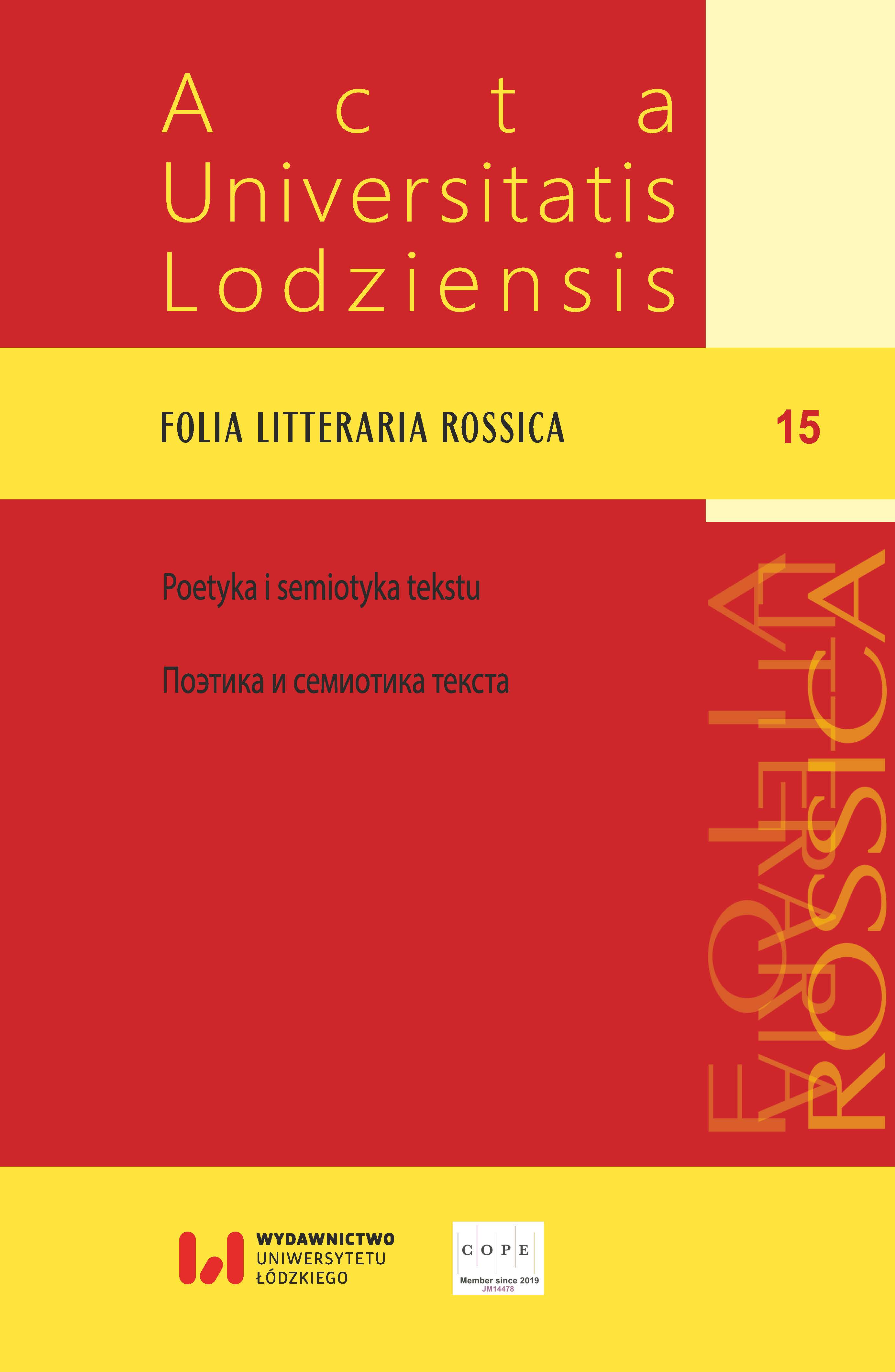Sergei Yesenin’s Olfactory and Peculiarities of its Reproduction in Polish Translations (Based on the Example of Selected Works)
DOI:
https://doi.org/10.18778/1427-9681.15.08Keywords:
Sergei Yesenin, Russian poetry, translation, smells in poetryAbstract
Sergei Yesenin is one of the most popular Russian poets in Poland. Interest in his poetry has been undiminished ever since the first translations of Inoniya (Otherland) and Tovarishch into Polish appeared in 1922.
Although the literary heritage of Yesenin has been professionally researched by Polish scholars and has attracted a large following of Polish readers for a century, there are gaps in his poetry that need to be filled. The author of this article investigates the role of scents in the poems of Sergei Yesenin, taking into account their changes throughout the creative process, from his juvenile works to his final texts. This approach allows us to present not only the poet’s worldview and his deep connection to the Russian culture, but also to trace the reflection of his individual linguistic worldview in his works. The article also presents a relatively new perspective on the reception of Yesenin’s poetry in Poland, namely the peculiarities and difficulties of translating into Polish the olfactory images used by the poet to convey profound emotions.
Downloads
References
Alimpieva, Roza V. “Khudozhestvenno-izobrazitelnaya rol alogo tsveta v poezii S. Eenina”. Uchenye zapiski. No 1 (1968): 177–194.
Google Scholar
Babulevich, Svetlana N. Tsvetooboznacheniya kak sredstvo realizacii kontsepta “Rodina” v khudozhestvennom mire S. Esenina. Avtoreferat dissertatsii na soiskanie uchenoi stepeni kandidata filologicheskikh nauk. Kaliningrad, 2004.
Google Scholar
Barkhudarov, Leonid S. Yazyk i perevod: Voprosy obshсhei i chastnoi teorii. Moskva: URSS, 2007.
Google Scholar
Curkan-Dróżka, Ełona. Metafora v tvorchestve Sergeya Esenina i ee perevod na polskii yazyk. Łódź: Wydawnictwo Uniwersytetu Łódzkiego, 2018.
Google Scholar
Czerniawska, Ewa; Czerniawska-Far Joanna-Maria. Psychologia węchu i pamięci węchowej. Warszawa: Wydawnictwo Akademickie i Profesjonalne, 2007.
Google Scholar
Eesenin, Sergei. Polnoe sobranie sochinenii: v 7 t. Vol. 1. Stihotvoreniya, ed. Yu. L. Prokushev. Moskva: Nauka: Golos, 1995.
Google Scholar
Esenin, Sergei. Polnoe sobranie sochinenii: v 7 t. Vol. 2. Malenkie poemy, ed. Yu. L. Prokushev. Moskva: Nauka: Golos, 1997.
Google Scholar
Esenin, Sergei. Polnoye sobranie sochinenii: v 7 t. Vol. 4. Stihotvoreniya (ne voshedshie v “Sobranie stihotvorenii”), ed. Yu. L. Prokushev. Moskva: Nauka: Golos, 2004.
Google Scholar
Esenin, Sergei. Ya Esenin Sergei: Poeziya i proza, ed. A. Marchenko. Moskva: Eksmo, 2006.
Google Scholar
Florenskii, Pavel A. Obratnaya perspektiva: soch. v 4 t. Vol. 3. http://philologos.narod.ru/florensky/fl_persp.htm
Google Scholar
Forstner, Dorothea OSB. Świat symboliki chrześcijańskiej, transl. W. Zakrzewska, P. Pachciarek, R. Turzyński. Warszawa: Instytut Wydawniczy Pax, 2001: 217–222.
Google Scholar
Grosbart, Zygmunt. Teoretyczne problemy przekładu literackiego w ramach języków bliskopokrewnych. Łódź: Wydawnictwo Uniwersytetu Łódzkiego, 1984.
Google Scholar
Jakobson, Roman O. O lingvisticheskikh apsektakh perevoda. In: Voprosy teorii perevoda v zarubezhnoi lingvistike, ed. V. N. Komissarov. Moskva: Mezhdunarodnye otnoshenia, 1978.
Google Scholar
Jesienin, Sergiusz. Poezje, transl. T. Nowak. Kraków: Wydawnictwo Literackie, 1975.
Google Scholar
Jesienin, Sergiusz. Poezje, Stihotvoreniya. Kraków: PIW, 1975.
Google Scholar
Lewicki, Roman. Zagadnienia lingwistyki przekładu. Lublin: Wydawnictwo Uniwersytetu Marii Curie-Skłodowskiej, 2017.
Google Scholar
Lewinson, Aleksei. Povsyudu chem-to pakhnet. In: Aromaty i zapakhi v kulture, ed. O. B. Vaynshtein. Vol. 2. Moskva: Novoe literaturnoe obozrenie, 2010.
Google Scholar
Marchenko, Alla M. Esenin – put i bespute. Moskva: Astrel, 2012.
Google Scholar
Marchenko, Alla M. Poeticheskii mir Sergeya Esenina. Moskva: Sovetskii pisatel, 1972.
Google Scholar
Rindisbaher, Hans D. “Ot zapakha k slovu: modelirovanie znachenii v romane Patrika Zuskinda ‘Parfiumier’”, transl. Ya. Tokareva. Novoe literaturnoe obozrenie. No 43 (2000). https://magazines.gorky.media/nlo/2000/3/ot-zapaha-k-slovu-modelirovanie-znachenij-v-romane-patrika-zyuskinda-parfyumer.html
Google Scholar
Rogacheva, Natalya A. Olfaktornoe prostranstvo russkoi poezii kontsa XIX–XX nachala vekov. Tyumen, 2010.
Google Scholar
Shiffman, Harvi R. Oschuschenie i vospriyatie, transl. Z. Zemchuk. Sankt-Peterburg: Piter, 2003.
Google Scholar
Vlakhov, Sergei; Florin, Sider. Neperevodimoe v perevode. Moskva: Mezhdunarodnye otnoshenia, 1980.
Google Scholar
Yushin, Petr F. Ideino-tvorcheskaya evolutsiya. Moskva: Izdatelstvo Moskovskogo universiteta, 1969.
Google Scholar
Zykhovskaya, Natalya L. “Dykhanie teksta: problema verbalizatsii zapakha v yazyke russkoi prozy”. Mir russkogo slova. No 4 (2015): 73–79.
Google Scholar
Downloads
Published
How to Cite
Issue
Section
License

This work is licensed under a Creative Commons Attribution-NonCommercial-NoDerivatives 4.0 International License.












